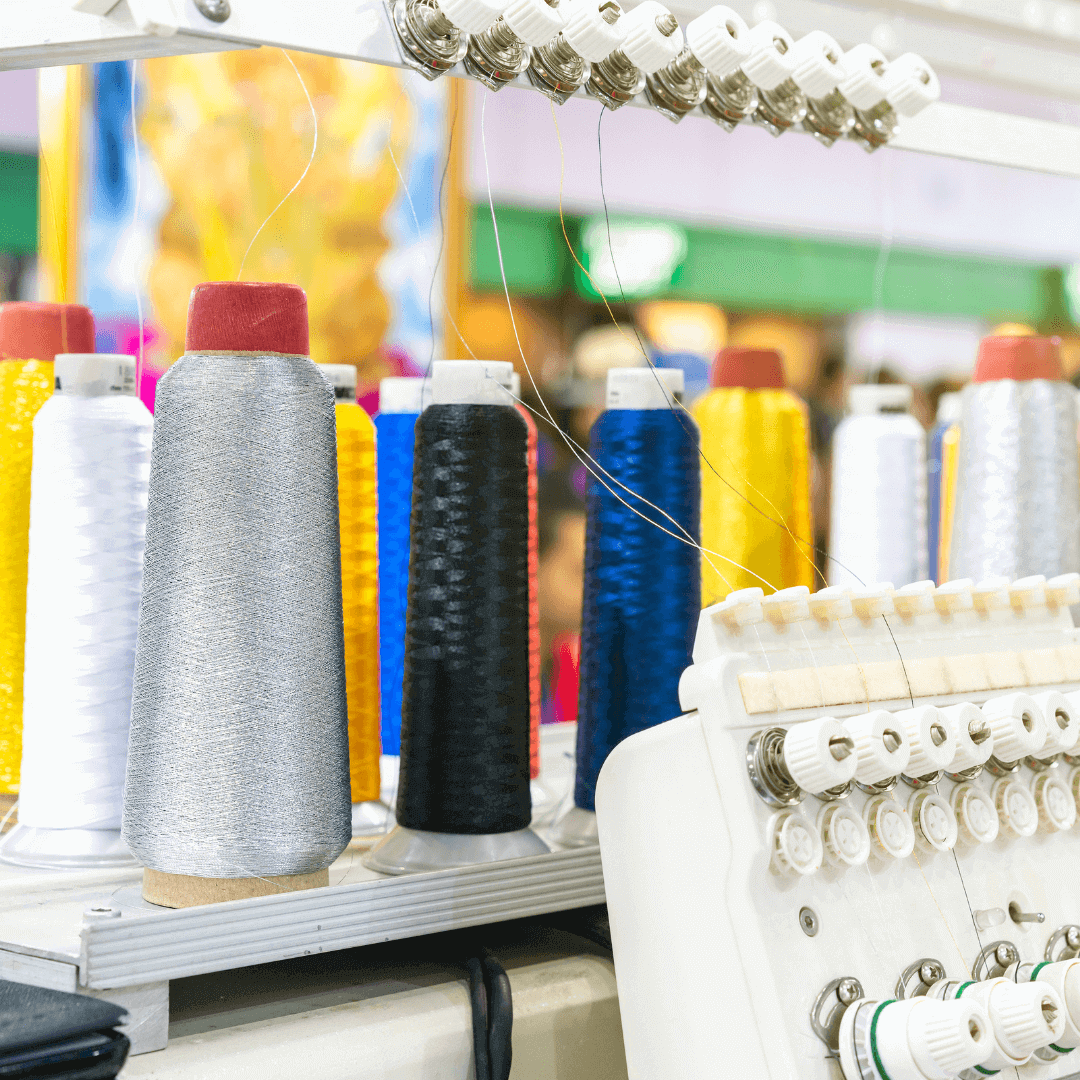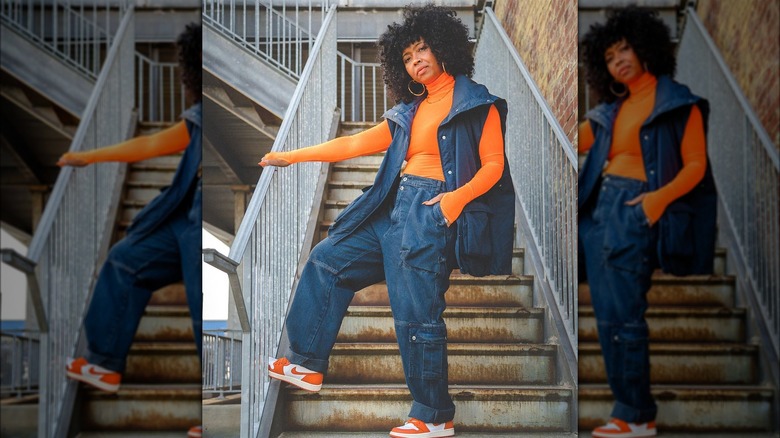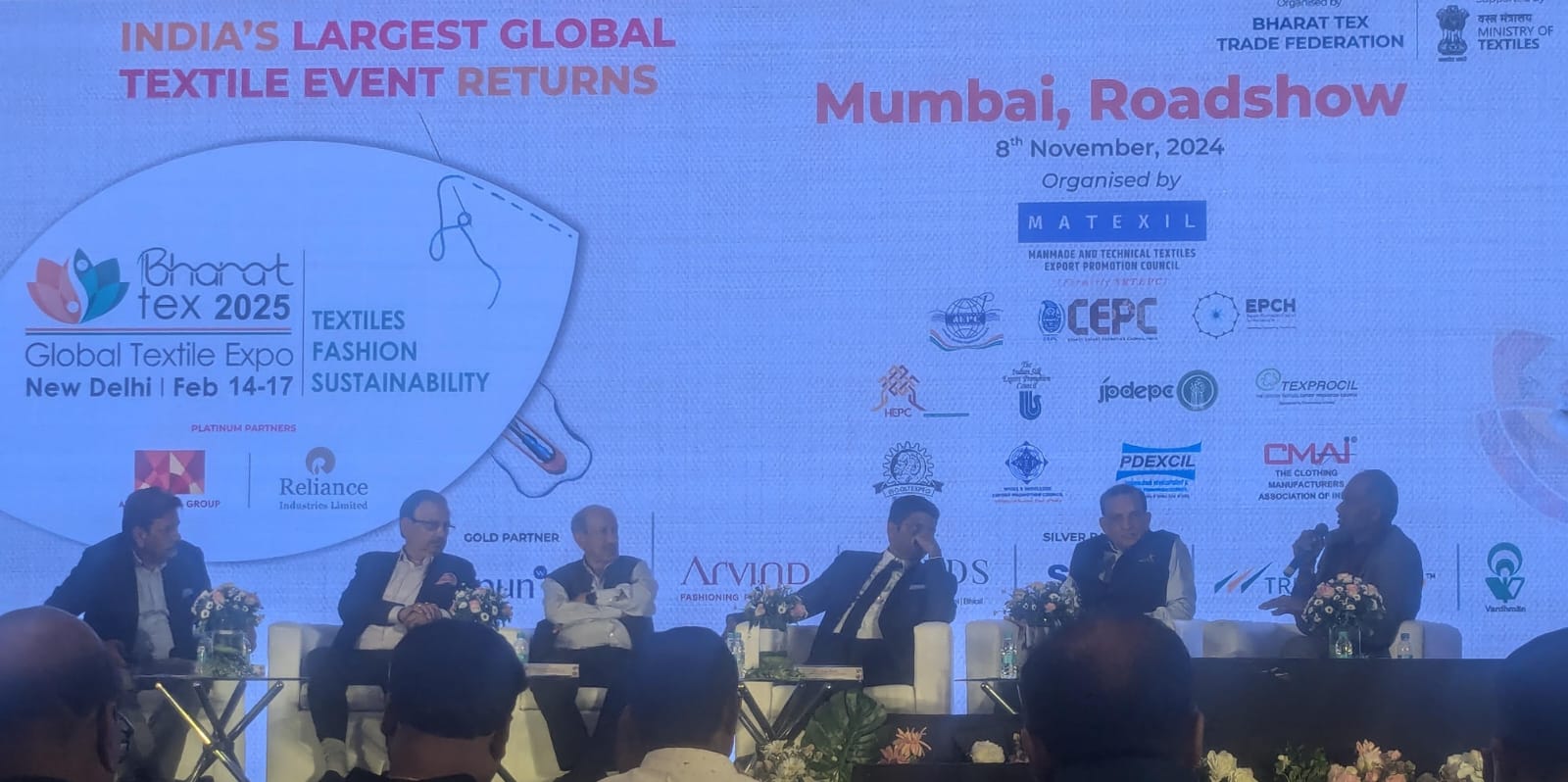FW
The 75th edition of the Cairo International Clothing, Textile and Accessories Exhibition, ‘Cairo Fashion & Tex,’ welcomed around 500 international buyers from Arab, African, and European countries. Held from October 3-5, 2024, the event is aimed at securing export deals for Egyptian companies in the clothing and textile sectors.
Organized by Pyramids International Group under the leadership of Mohamed El-Sherif, the exhibition features 550 Egyptian and foreign companies showcasing the latest innovations in clothing and textile technologies. It is held under the patronage of Egypt’s Ministries of Industry and Investment, with support from the Ready-Made Garment Chamber of the Egyptian Federation of Industries.
The event has drawn key figures such as Younes Al-Mufti, President of the Moroccan Association of Textile Importers, NihadAkinci, Chairperson of the Egyptian-Turkish Businessmen Association, and Sultan Allan, head of Jordan’s Textile and Readymade Clothes Syndicate. Karima Al-Mars, Economic Counsellor at the Moroccan Embassy in Cairo, also attended the inauguration.
Al-Mufti praised the warm reception of the Moroccan delegation, which consists of 30 importers. He emphasized the delegation’s interest in securing export deals and boosting trade relations with Egypt. Similarly, Akinci highlighted the historical trade ties between Egypt and Turkey, noting the importance of exhibitions like ‘Cairo Fashion & Tex’ in strengthening economic collaboration.
El-Sherif stated that numerous bilateral meetings have been held, resulting in the signing of contracts. Export deals from the exhibition are expected to surpass $30 million. He underscored that such events contribute to Egypt’s broader goal of reaching $145 billion in annual exports.

Apparel imports in key markets have shown some recovery in Q1 2025 reveals Wazir Advisors ‘Q1 FY25 Wazir textile & apparel index’. The latest import data indicates the global apparel market has seen some positivity. Key markets, including the US, EU, UK, and Japan, witnessed a consistent increase in apparel imports compared to the previous year. This suggests a growing demand for apparel products in these regions, which could be attributed to factors such as economic recovery, changing consumer preferences, and increased retail activity.
Rising imports a sign of positivity
The study shows, US apparel imports rose by 8 per cent year-over-year (YoY) to reach $ 8 billion. EU imports increased 5 per cent YoY to $8.1 billion. Similarly, UK’s imports saw a 7 per cent YoY growth, reaching $1.6 billion. The Japanese market experienced the most significant increase, with imports growing by 16 per cent YoY to $2.2 billion. This suggests that consumer confidence and spending are gradually recovering, particularly in the wake of economic uncertainties.
Apparel retail scenario
Interestingly in August 2024, US monthly apparel store sales are estimated at $19.1 billion which is 1 per cent lower compared to the previous year, while monthly home furnishing store sales are estimated at S$ 5.3 billion which is 8 per cent higher than in August 2023. On YTD basis, sales in 2024 are 4 per cent lower than in 2023. At the same time, for last several quarters, several major retailers like Target, Walmart, VF Corp among others have reported lower inventory levels compared to same period in the previous year. In the UK apparel store sales remained unchanged in August 2024 at £ 3.6 billion. On YTD basis, the sales in2024 is 3 per cent lower than in 2023.
The study also revealed, in August 2024, the US recorded its lowest inflation rate since February 2021 at 2.5 per cent; unemployment rate decreased by 0.1 per cent, after peaking in July at 4.3 per cent since December 2021. Also, the Consumer Confidence Index rose by 3 per cent and with the recent announcement by the US Federal Reserve to cut interest rates, a positive macroeconomic trend may be expected in coming months.
India scenario
Wazir textile and apparel index also registered improvement. With a steady rise in demand and improved market sentiment, the financial performance of Indian textile and apparel companies saw notable growth in the last quarter. According to our quarterly report, compared to Q1 FY24, Q1 FY25 showed an 11 per cent increase in WTI sales and a 29 per cent rise in WTI EBITDA. Meanwhile, WAI sales grew by 19 per cent, and WAI EBITDA saw a 13per cent increase.
An analysis of select top textile companies revealed at consolidated level, sales have increased by 12 per cent in Q1 FY25 compared to Q1 FY24. Consolidated EBITDA margin increased by 2 percentage points for the selected top companies in Q1 FY25 compared to Q1 FY24.
Consolidated analysis for the selected top apparel players At consolidated level, sales have increased by 19 per cent in Q1 FY25 compared to Q1 FY24. However, consolidated EBITDA margin remained same for the selected top companies in Q1 FY25 compared to Q1 FY24. Consolidated sales index increased by 6 per cent in Q1 FY25 compared to Q1 FY24. Consolidated EBITDAper cent has increased by 1 percentage points in Q1 FY25 compared to Q1 FY24.
Overall analysis
The latest import data and macroeconomic indicators provide encouraging signs of a demand revival in key markets for apparel. The consistent growth in apparel imports from various regions, coupled with positive developments in retail sales and macroeconomic factors, suggest that consumer confidence and spending are gradually improving.
The US, a major market for apparel imports, has shown steady growth in recent months. The increase in imports from the European Union, the UK, and Japan also indicates a growing demand for apparel products in these regions. The positive macroeconomic trends in the US, including declining inflation, decreasing unemployment, and rising consumer confidence, create a favorable environment for apparel consumption. The Federal Reserve's decision to cut interest rates further supports this positive outlook.
In India, the strong growth in apparel exports is a testament to the country's competitiveness and increasing global market share. The projected increase in total exports to $15 billion in 2024 highlights the potential for further growth and development of the Indian apparel industry.
The improvement in the Wazir textile and apparel index and the strong financial performance of Indian companies underscore the positive sentiment and growth prospects within the domestic market. The increase in sales and EBITDA across various segments indicates a healthy and expanding industry. Overall, the data presented in this report suggests that the apparel industry is recovering from the challenges faced in recent years. The early signs of demand revival in key markets, coupled with positive macroeconomic indicators and improving market sentiment, provide a promising outlook for the future growth of the industry.
Appointed as the senior management member of Welspun Living since Oct 04, 2024, Saumil Mehta will lead the home textiles business of the company’s subsidiary Welspun Global Brands. In this capacity, he will report to Dipali Goenka, Managing Director and CEO.
With an extensive experience spanning over 20 years across the FMCG and FMCD sectors, Mehta has led several business transformations, sales, consumer marketing, brand development and strategic business portfolios. Armed with a BE degree in Civil Engineering from the Birla Vishwakarma Mahavidyalaya and a Master’s degree in International Business from the Symbiosis Institute, Mehta has previously worked for leading organiations including Jubilant Foodworks, PepsiCo India Holdings, and Kraft Heinz India.
Driven by a rising demand for sustainable, eco-friendly textiles, the global hemp yarn market is witnessing a significant growth. Valued at $14.36 billion in 2023, the market is expected to grow by a11.71 per cent CAGR from 2025-32, to reach a value of $38.9 billion by 2032.
Along with its biodegradability, Hemp’s requirement of minimal water and pesticides make it an ideal alternative to conventional materials like cotton. Additionally, the material is naturally resistant tomold and ultraviolet light. Its hypoallergenic properties make it an ideal material for those with sensitive skin.
Being increasingly adopted for apparel, home textiles, and accessories, hemp is becoming a fashionable and eco-conscious choice for designers. However, the material still faces stigma due to its association with cannabis, which can hinder growth, particularly in regions with regulatory challenges. The market also suffers from a limited and fragmented supply chain often leading to price volatility and difficulty in meeting rising demand.
Further complicating the issue, regulatory barriers including hemp cultivation and processing laws in some countries threaten to impede market growth. However, advancements in cultivation techniques, fiber extraction, and spinning technologies are helping make the material more competitive by improving its quality and consistency. Combining hemp with cotton, wool, or polyester, blended yarns are rising in popularity, offering enhanced properties like softness and strength.
E-commerce is playing a pivotal role in expanding the market by providing consumers worldwide easy access to hemp-based products. North America leads the market in the US with the 2018 Farm Bill legalising hemp cultivation. Another key region is Europe, where sustainability initiatives in countries like Germany and France are driving growth in hemp textiles. Meanwhile, Asia-Pacific, with its traditional textile industries in countries like China and India, is emerging as a strong growth market.
In 2024, Burberry’s brand value fell $2 billion reveals Kantar’ annual ranking of UK’s top 75 brands. The report titled, ‘Brandz,’ reveals, the dip in Burberry’s value makes it the second-largest loser after St James’s Place. With the luxury industry hit hard by a downturn in spending as the ‘revenge shopping’ post-COVID-19 fades, even the wealthiest consumers have been feeling the effects of the cost-of-living crisis. Luxury players like LVMH are also facing challenges with Bernard Arnault, CEO, LVMH dropping from the top spot as the world’s richest person.
For Burberry, the luxury downturn coincided with internal issues as its drawn-out turnaround plan faltered, leading to the brand’s value reducing to a half in 2024. The brand sacked Jonathan Akeroyd as its CEO in July after the company issued its third profit warning of the year and suspended its dividend, causing shares to plummet. The brand also terminated hundreds of employees with a fall in its valuation leading ton investment analysts speculating about a potential takeover. In August, Burberry was removed from the FTSE 100, the benchmark for the UK's biggest stocks.
Several factors are responsible for Burberry’s current struggles, opine analysts. These include the brand’s over dependence on slower-growing apparel segments and weak performance in iconic outerwear and leather goods. The brand also made multiple changes in creative direction over the past decade. Combined with recent price hikes, these failed to resonate with aspirational consumers amid a broader slowdown in luxury spending.
However, Jelena Sokolova, Analyst, Morningstar, believes, the brand still has an opportunity to recover by renewing focus on outerwear collections and designing more affordable ranges, Other retailers such as Marks & Spencer, meanwhile, are witnessing 38 per cent boost in brand value, a result of positive shifts in consumer perception of both its grocery and fashion offerings.
The Lenzing Group, a global leader in sustainable cellulose fiber production, has acquired a minority stake in TreeToTextile AB, joining existing stakeholders H&M Group, Inter Ikea Group, Stora Enso, and LSCS Invest. This partnership is centered on advancing the production of sustainable fibers to drive positive change in the textile industry.
Lenzing has been a leader in sustainable fiber production for more than 85 years, with its fibers marketed under the Tencel, LenzingEcovero, and Veocel brands. CEO Rohit Aggarwal emphasized that TreeToTextile’s technology complements Lenzing’s efforts to lower the environmental impact of fiber production, reinforcing the company’s commitment to innovation and sustainability.
TreeToTextile, established in 2014, focuses on developing eco-friendly processes for cellulosic fiber production. CEO Roxana Barbieru emphasized that Lenzing’s involvement will accelerate their market reach and enhance their sustainability efforts.
The deal, subject to regulatory approval, is expected to close by the first half of 2025.
In its interim report for FY2024-25, British supermarket chain Tesco reported a 0.3 per cent rise in sales from its ‘Home and Clothing’ division.
The retailer’s sales from the ‘Home’ and Clothing’ division rose by 1.6 per cent. Tesco attributes this growth to the continued strong performance of its clothing range, which it stated is ‘outpacing the broader store-based clothing market.’
The report also noted a (1.3) percentage point impact due to the company’s new partnership with The Entertainer, which affects Tesco’s toy offerings. This partnership has also affected the company’s sales in the ‘Home’ and clothing division. However, sales in this division are expected to recover by the second half of the year.
In total, Tesco’s group sales grew by 3.5 percent at actual rates and 4 percent at constant rates during the last quarter, reaching US $41.28 million.
Launched by the Organic Cotton Accelerator (OCA) in partnership with the Global Organic Textile Standard in Sept 2024, the #BehindTheSeams campaign attracted participation from over 290 brands across the world.
The 2nd annual campaign featured daily giveaways from fashion, soft home and other textiles brands. Home brands who participated in bedding giveaways included Naturepedicand Mungo. Highlighting ‘organic in-conversion’ farming, the #BehindTheSeams campaign urges brands to support farmers during the critical transition period. OCA provides critical resources such as capacity-building, premium payments and market linkages.
The organisation collaborated with over 35,000 in-conversion farmers in Indiaand Pakistan during the 2023-2024 cotton season as a part of a broader program that supports over 80,000 farmers. This collaboration was facilitated by 16 brands who participated in OCA’s Farm Program.
At an event in Leh, Giriraj Singh, Union Minister for Textiles, presented Brigadier (Dr) BD Mishra, Lieutenant Governor (Retd) with the Certificate of Geographical Indication (GI) Registration for Ladakh’s renowned Pashmina wool. The GI tagging would prevent Kashmiri traders from falsely marketing Ladakh's prized Pashmina wool as their own, said Singh.
Emphasising the benefits of this GI recognition for the people of Ladakh, especially the Pashmina herders, Singh said, herders would greatly benefit from this GI recognition as though known as ‘Soft Gold,’ Ladakh’s Pashmina wool has historically been misused by others promoting it under a different identity.
Emphasising on the importance of supporting Pashmina and Merino sheep stall feeding, Singh urged the government to increase the production of Pashmina wool in Ladakh, ensuring higher revenue for goat herders. Helauded the efforts of the Union Territory Administration to reduce the mortality rate among Pashmina goat offspring.
Further, Singh proposed measures to further strengthen the Pashmina wool industry in Ladakh. These included establishing Pashmina breeding farms in Leh and Kargil to prevent inbreeding, promoting artificial insemination, and launching selective breeding projects. He also suggested holding competitions among farmers for best practices, offering incentives, testing the nutritional value of Pashmina goat milk, and improving fodder by making feed pellets from stocked supplies.
Hailing the GI registration of Ladakh’s Pashmina Wool as historic milestone, Mishra criticized the sale of inferior or fake Pashmina products as having previously undermined the authenticity of Ladakh’s top-quality Pashmina wool. He urged the Ministry to support the further development and promotion ofLadakh’s Pashmina industry. He also stressed on the need to encourage young people to participate in the traditional practice of Pashmina goat herding, preserving this age-old culture.
The Global Fashion Agenda (GFA) has launched a new initiative to support stakeholders to foster a circular textile industry in Indonesia.
Titled, ‘Circular Fashion Partnership: Indonesia,’ the initiative has been launched in partnership with Rantai Tekstil Lestari (RTL) Indonesia. It is supported by implementation partners Reverse Resources, Closed Loop Fashion, and Circle Economy Foundation, and funded by H&M Foundation and contributions from the private sector.
The initiative urges brands, manufacturers, waste handlers, recyclers and government agencies to actively participate in the collective action program to achieve impact at scale.
A cross-sectorial initiative, The Circular Fashion Partnership: Indonesia aims to develop effective circular fashion systems by capturing and recycling post-industrial textile waste. The program seeks to minimise virgin resources use by increasing the availability of recycled materials. The program organises raining sessions and working groups for brands, local manufacturers, waste handlers, recyclers, and knowledge institutes to help promote best practices and educate industry stakeholders on the principles of the circular economy.
Project national lead, RTL ensures, the program is customised to the local context and includes all local stakeholders. It also confirms the program’s alignment with government’s strategy, and its connection with the right ministries to help bridge the identified policy gaps.












